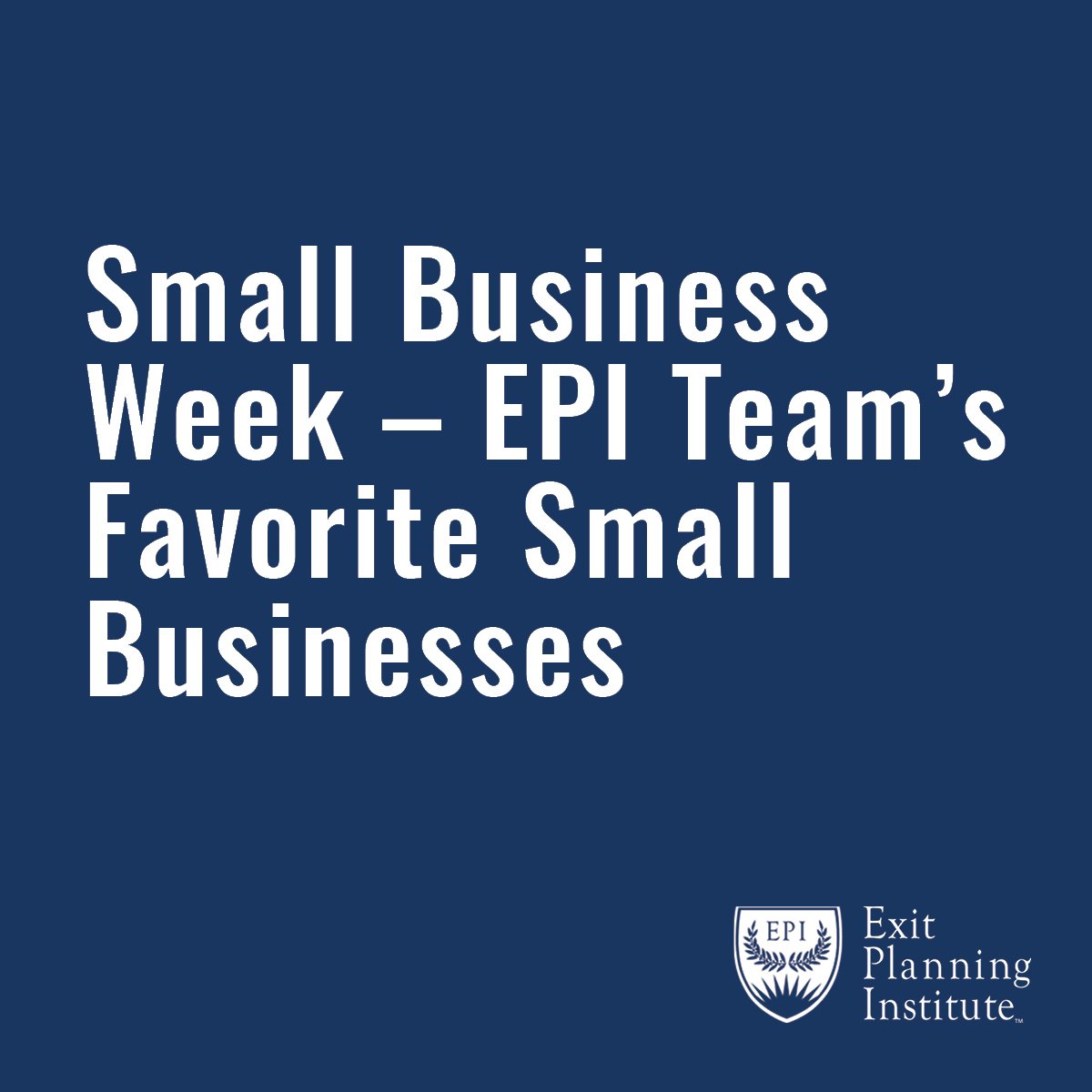
THE EXIT PLANNING BLOG
Keep up-to-date with exit planning, succession planning, industry trends, unique specialty insights, and useful content for professional advisors and business owners.
Share this
How Exit Planning Builds Value in Your Small Business
by Colleen Kowalski on May 6, 2022

Small businesses employ over 61.2 million employees, accounting for roughly 46.8% of all employees in the United States of America. Additionally, small businesses make up 99.9% of all private establishments in the United States. However, 50% of small businesses fail after five years. What causes these businesses to fail? More importantly, how can exit planning help turn them into significant companies?
The first week of May is Small Business Week. The success of small businesses not only benefits the owner, but the communities they support, the people they employ, and the consumers they serve. Learn how to build value in your small business while planning for your eventual exit.
The Importance of a Business Valuation
Conducting an annual business valuation will help determine what factors to focus on in the interest of accelerating the value of your business. A valuation highlights areas of risk, shows what improvements have been made to the business, and most importantly, helps ensure the business owner’s goals are being met.
Even if a business owner is not planning on exiting their business anytime soon, a business valuation to identify key risks in their company is still a crucial step to take. Without first identifying your baseline business value, you have no understanding of what metrics need improving, the strength of your intangible capitals, or if your business is as valuable as you might think it is.
Complete Business Attractiveness and Owner Readiness Assessments
As a business owner, you are extremely tied to your business and can be too close to the situation to see the negatives. For example, you only see the positives in the business. To you, complications are simply a part of the business and not an area for improvement that your customers need. This is where Readiness and Attractiveness Scores come into play. According to Walking To Destiny, business owners must complete personal, financial, and business assessments to produce two scores: Business Attractiveness and Exit Readiness.
Landon Mance, Co-Founder of Backbone Planning Partners, shares, “A successful exit or exit plan has so much more to do with than just simply selling or transitioning your company. You must have a great team, expectations should be very clearly communicated, and the owner has to understand the financial and mental implications of no longer owning and running their business.”
Business Attractiveness
Business Attractiveness answers the question, “How attractive is your business in the eyes of a buyer?” A buyer could be a family member, another employee, or a third-party buyer. The Attractiveness Index has 25 questions in four categories. Each category provides a score that is averaged to come up with the overall Attractiveness Score. A score of 50% or lower indicates that your company is “discounted” and serves as a red flag for owners. A business with a score between 58%-72% is of above-average attractiveness, and over 72% is considered a best-in-class business.
Owner Readiness
Exit Readiness asks the question, “How ready are you and the business to transition?” This index has over 120 questions in 22 personal, business, and financial categories. Again, the results from each category are averaged to get the overall score for the index. Those businesses that score above a 72% are considered best-in-class.
Attractiveness and Readiness are not the same things. Just because your business scored highly on the Attractiveness Index, does not mean you are personally ready to exit your business. Similarly, if you are personally ready to exit your business, it does not automatically mean your business is attractive to buyers. Chris Snider writes in Walking to Destiny, “Readiness is just as important as attractiveness. I could argue that it is even more important because it also includes personal and financial readiness.”
CEPAs, view the Readiness and Attractiveness Indexes in the Member Center.
Improve Your Intangible Capitals
Human Capital
The strength of the intangible capital in your business is one of the key drivers of value. According to Walking to Destiny, “62% of owners indicated that finding and retaining top talent is the biggest challenge they face.” When working on your employee development plans, follow a series of steps that encourage growth in your Human Capital and your small business.
Landon Mance believes that the Human Capital in your business is the most crucial for building value. He shares, “It’s all about the people you surround yourself with.”
Social Capital
The Social Capital in your business incorporates this purpose, reflects your organization’s vision, and is ever-present in the day-to-day operations of your business. In a business, the strength of the social capital also begins with strong foundational elements; the organization’s vision and purpose. Your purpose guides every aspect of your business. Christopher Snider writes, “Purpose expresses personal values, inspires and unifies the team, focuses action, and disciplines you to think strategically.”
Customer Capital
Building your Customer Capital is one way to improve the overall value of your business. Judy Bodenhamer, Founder and Managing Director of Client Experience Group, highlights five key components to building customer capital through an enhanced client experience.
- Incorporate client experience into your strategic plan
- Establish a steering committee focused on customer engagement
- Calibrate your client experience based on customer feedback and needs
- Encourage leaders on your team to take initiative in the customer journey
- Establish clear metrics to measure the success of your strategy
Structural Capital
The most robust of all intangible capitals is Structural Capital. It encompasses everything that makes your company work efficiently. The process, documentation, training programs, technology, tools, equipment, and real estate. Exit Planning Institute President, Scott Snider says, “Bottom line, I don’t think there is a more robust intangible capital than the processes that make your business.” This capital captures the knowledge assets within your company, converting that mental process into company property and, therefore making it transferable.
Landon suggests an owner take an in-depth look at their business and understand their “why?” He states, “Why do you want to grow business value? Do you want more take-home income? Do you want to sell the business for X dollars at some point in the future? Do you want to hire additional people? Do you need additional value from the company to fund your retirement? And second, what are you willing to sacrifice in order to accomplish what you’re setting out to accomplish? Ponder those two things and you’ll be off to a productive start.”
By improving your small business value today, you prepare your business for success when you decide to exit. Learn more about Value Acceleration in our Exit Planning Content Library.
Share this
- Blog (548)
- CEPA (431)
- exit planning (249)
- CEPA community (188)
- Business Owner (175)
- Exit Planning Summit (99)
- EPI Chapter Network (89)
- Value Acceleration Methodology (81)
- Exit Planning Partner Network (76)
- EPI Announcement (50)
- Content (48)
- Webinars (37)
- Excellence in Exit Planning Awards (34)
- Marketing (30)
- 2024 Exit Planning Summit (28)
- 5 Stages of Value Maturity (26)
- Books (24)
- EPI Academy (24)
- EPI Team (22)
- Exit Planning Teams (22)
- Leadership (21)
- 2023 Exit Planning Summit (20)
- family business (20)
- women in business (19)
- Intangible Capital (18)
- Exit Options (17)
- Black Friday (16)
- CPA (15)
- Walking to Destiny (15)
- Chapters (14)
- State of Owner Readiness (14)
- charitable intent (13)
- Chris Snider (12)
- National Accounts (12)
- Small business (12)
- personal planning (12)
- Financial Advisors (11)
- Season of Deals (9)
- 5 Ds (8)
- About us (8)
- Podcast (8)
- Scott Snider (8)
- Insiders Bash (7)
- Christmas (6)
- Exit Planning Content Library (6)
- Case Studies (5)
- Owner Roundtables (5)
- Three Legs of the Stool (5)
- Value Advisors (5)
- financial planning (5)
- Awards (4)
- Circle of Excellence (4)
- EPI Thought Leadership Council (4)
- Exit & Succession (4)
- Five Ds (4)
- executive training (4)
- DriveValue (3)
- Owners Forum (3)
- author (3)
- forbes (3)
- Exit Is Now Podcast (2)
- Peter Christman (2)
- Veteran (2)
- Whitepapers (2)
- Annual Exit (1)
- Business Owners Forum (1)
- SOOR (1)
- business consultants (1)






